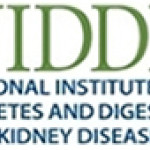- Industria: Government; Health care
- Number of terms: 17329
- Number of blossaries: 0
- Company Profile:
The National Institute of Diabetes and Digestive and Kidney Diseases (NIDDK) conducts and supports research on many of the most serious diseases affecting public health. The Institute supports much of the clinical research on the diseases of internal medicine and related subspecialty fields, as ...
A test done by an eye care specialist in which the pupil—the black center—of the eye is temporarily enlarged with eyedrops to allow the specialist to see the inside of the eye more easily.
Industry:Health care
A term used when a person's blood glucose level moves often from low to high and from high to low.
Industry:Health care
A term used in clinical trials where one group receives treatment for diabetes in which a1c and blood glucose levels are kept at levels based on current practice guidelines. However, the goal is not to keep blood glucose levels as close to normal as possible, as is done in intensive therapy. Conventional therapy includes use of medication, meal planning, and exercise, along with regular visits to health care providers.
Industry:Health care
A term for fat in the body. Lipids can be broken down by the body and used for energy.
Industry:Health care
A surgical procedure to take a healthy whole or partial pancreas from a donor and place it into a person with diabetes.
Industry:Health care
A sugar that occurs naturally in fruits and honey. Fructose has 4 calories per gram.
Industry:Health care
A substance the pancreas releases into the bloodstream in equal amounts to insulin. A test of c-peptide levels shows how much insulin the body is making.
Industry:Health care
A substance produced in the liver in response to injury or inflammation. Elevated levels of c-reactive protein are associated with a higher risk of heart attack and stroke.
Industry:Health care
A study by the national institute of diabetes and digestive and kidney diseases, conducted from 1983 to 1993 in people with type 1 diabetes. The study showed that intensive therapy compared with conventional therapy significantly helped prevent or delay diabetic retinopathy, kidney disease, and nerve disease. Intensive therapy included multiple daily injections of insulin or the use of an insulin pump with multiple blood glucose readings each day.
Industry:Health care
A study by the national institute of diabetes and digestive and kidney diseases conducted from 1998 to 2001 in people at high risk for type 2 diabetes. All study participants had impaired glucose tolerance, also called pre-diabetes, and were overweight. The study showed that people who lost 5 to 7 percent of their body weight through a low-fat, low-calorie diet and moderate physical activity—usually walking for 30 minutes 5 days a week—reduced their risk of getting type 2 diabetes by 58 percent. Participants who received treatment with the oral diabetes drug metformin reduced their risk of getting type 2 diabetes by 31 percent.
Industry:Health care
